Simple Home Remedies For Bloating
By Dr Smita Barode +2 more

Get,

to manage your symptom
Get your,


4 Cr+ families
benefitted

OTP sent to 9988776655



You’ve successfully subscribed to receive
doctor-approved tips on
Whatsapp

Get ready to feel your best.

Hi There,
Download the PharmEasy App now!!


Register to Avail the Offer
Send OTPBy continuing, you agree with our Privacy Policy and Terms and Conditions

Hi There,
Sign up on PharmEasy now!!
Trusted by 4 crore+ families

OTP sent to 9988776655



You have unlocked 25% off on medicines




Code: NU25
By Dr Smita Barode +2 more
Table of Contents
Do you feel like a balloon in your stomach? This is because you have the issue of stomach bloating! And if you are looking for some home remedies to help with your bloating, then yes, you have visited the right place. Bloating is a condition that causes the abdomen to feel tight and full, as well as the stomach to appear swollen1. The feeling of bloating can range from slightly uncomfortable to extremely painful. It usually goes away in some time, but it can be a recurring issue for some people2.

Excessive intestinal gas is the most common cause of bloating2. Other common causes of bloating include the following:
Bloating can sometimes be caused by more serious medical conditions that include:
It might be a serious problem if your bloating is accompanied by abdominal pain, cramps, nausea or vomiting. Persistent bloating that doesn’t improve with lifestyle changes, such as eating smaller meals or avoiding certain foods, may also point to a more serious issue.
Dr Ashish Bajaj, M.B.B.S M.D. in Clinical Pharmacology and Toxicology
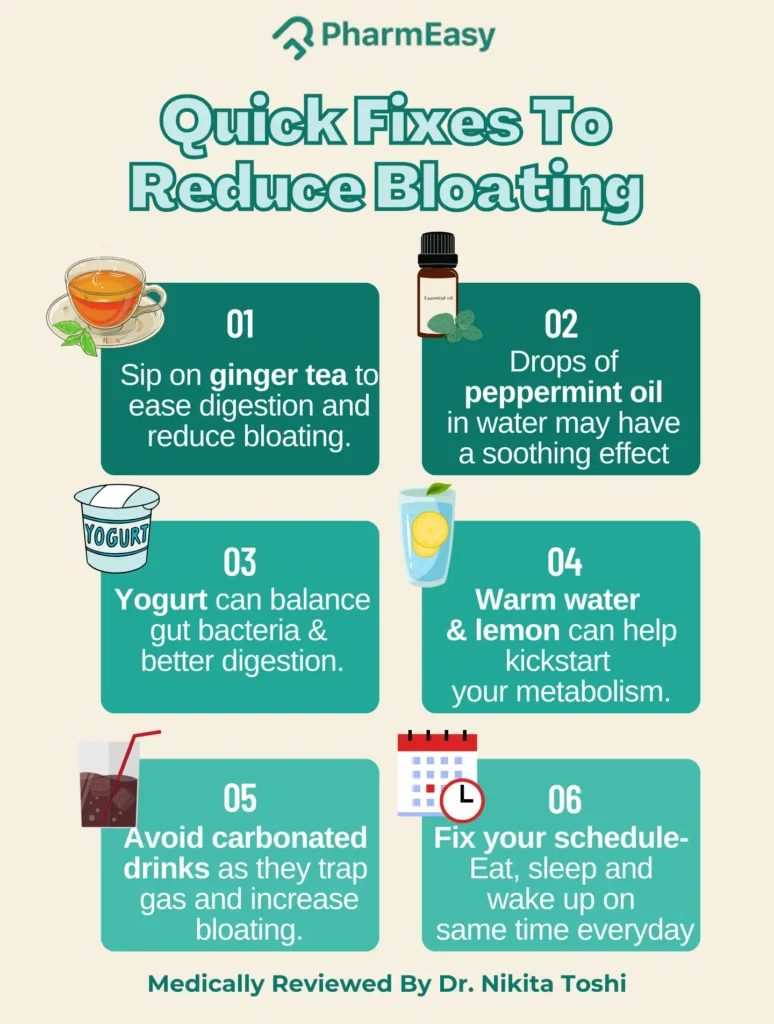
The following are some of the home remedies that may help you relieve bloating:
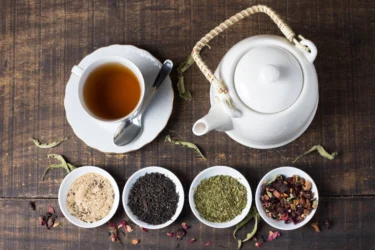
Herbal teas may aid in digestion and relieve gas. Some of the herbal teas that might benefit you for bloating are chamomile, peppermint, turmeric, ginger, and fennel tea. Dandelion tea may help to relieve water retention, thereby reducing bloating2.
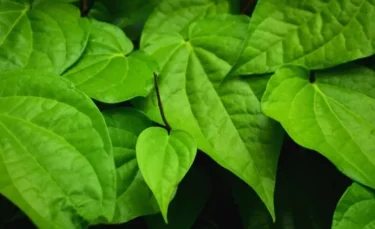
According to Ayurveda, pan is a post-meal digestive stimulant4. You can chew betel leaves after meals; this can help with digestion. It may stimulate the secretion of digestive juices, relieve constipation and aid in reducing stomach bloating5.
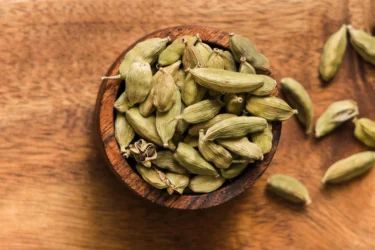
Traditionally, cardamom was used as a stomachic (helps digestion and promotes appetite), anti-flatulent (prevents gas accumulation) and for managing indigestion6. You can take some cardamom, shunti (dry ginger), and rock salt and make a fine powder of it. You can take this with warm water. This might be helpful in bloating and indigestion5.
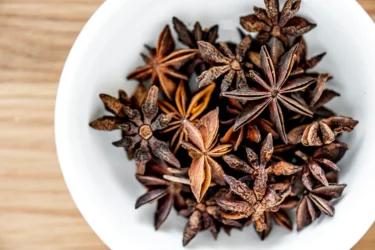
The star anise fruit acts as a carminative (to relieve gas from the intestine) and is used for indigestion and to relieve bloating7. You can take some anise powder and mix it with honey. It helps with digestive issues like bloating, flatulence, stomach pain, and colic (abdomen pain)5. The fruits of this tree are also used for making tea and might be helpful in stomach bloating and indigestion.
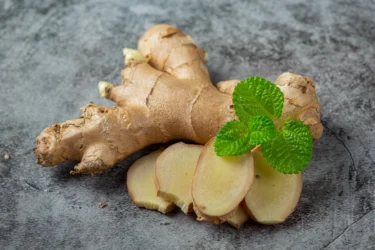
Ginger is an essential dietary agent that has carminative properties. It has been used for a long time to manage digestive issues like bloating, constipation, indigestion, discomfort, etc8. You can prepare ginger tea by adding ginger to the water and boiling it. This may help manage stomach bloating.
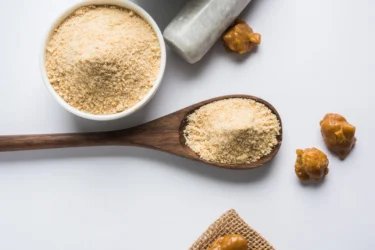
Hing is a popular ingredient in several foods. Its health benefits are that it helps to reduce bloating, menstrual pain, and indigestion9. You can take warm water with some hing in it. This may help with bloating.
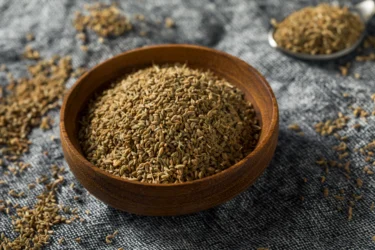
In Iran, ajwain has been used as an herbal remedy for a variety of gastrointestinal conditions, including bloating. It also has anti-inflammatory properties that also might be beneficial for bloating10. You can chew some ajwain seeds. You can also boil some ajwain in water, allow it to cool and then drink it.
Also Read: Natural Home Remedies For Constipation By Dr. Siddharth Gupta
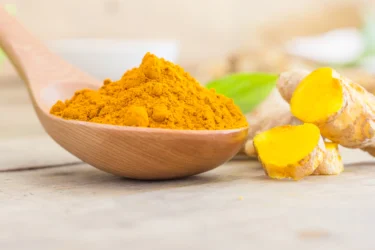
Turmeric is considered one of nature’s most potent healing agents. It acts as a digestive stimulant as well as a carminative. It is added to a variety of dishes to improve digestion and reduce gas and bloating. You can take turmeric as a dry powder mixed in plain water or buttermilk, which is highly beneficial for stomach issues11.
It is essential to educate patients on the benign course of this disorder, to establish long-term care and expectations for treatment. If red flag signs like unintentional weight loss, persistent vomiting, or dysphagia are present, further evaluation is recommended.
Dr. M.G. Kartheeka, MBBS MD(Pediatrics)
For more tips to reduce bloating CLICK HERE
Also Read: Natural Home Remedies for Loose Motion
Seek medical help if your stomach bloating:
You must also seek medical help if you notice other symptoms along with bloating, like:
Also Read: Natural Laxatives: Your Guide to Safe and Effective Remedies for Constipation
Bloating is a common experience and a very unpleasant feeling. However, it can be managed using some of the above-mentioned tips that may help to prevent stomach bloating from worsening. Additionally, home remedies such as herbal teas, elaichi, pan, star anise, ginger, hing, ajwain, and turmeric may be beneficial in reducing bloating. However, if the bloating persists for more than a week and you have other symptoms, which are worsening your condition, then in such cases, you must consult your doctor.
Also Read: 5 Instant Home Remedies For Gastric Problem
Yes, turmeric is an excellent healing agent and acts as a carminative and digestive stimulant. You can mix turmeric powder in plain water or buttermilk; this helps manage bloating11.
If you have been experiencing stomach bloating for more than a week, you must seek medical help2. There could be some condition that is causing the bloating. Your doctor will examine you properly and will suggest you the treatment accordingly.
Yes, herbal teas may help you to get rid of bloating. Herbal tea includes chamomile, peppermint, turmeric, ginger, and fennel. Even dandelion tea may help relieve bloating caused by water retention2.
Yes, ajwain has been used as a herbal remedy for various gastrointestinal conditions, including bloating. It has anti-inflammatory properties as well10. You can chew some ajwain seeds and boil some ajwain in water, allow it to cool and then drink it.
Yes, hing has several health benefits and also helps in reducing bloating9. You can mix some hing in warm water and drink it. This could help you manage your bloating problem.
1. Abdominal bloating. [Internet]. MedlinePlus National Library of Medicine. 2022. Available from: https://medlineplus.gov/ency/article/003123.htm
2. Bloated Stomach [Internet]. Cleveland Clinic. 2021. p. 1–13. Available from: https://my.clevelandclinic.org/health/symptoms/21740-bloated-stomach
3. Bloating [Internet]. American Academy of Family Physicians. 2021. p. 1–4. Available from: https://familydoctor.org/condition/bloating/
4. Toprani R, Patel D. Betel leaf: Revisiting the benefits of an ancient Indian herb. South Asian J Cancer. 2013 Jul-Sep;2(3):140–141. doi: 10.4103/2278-330X.114120. PMCID: PMC3892533. PMID: 24455591. Available from: https://pmc.ncbi.nlm.nih.gov/articles/PMC3892533/
5. AYUSH. Ayurveda Offering Herbal Healing [Internet]. 1–128 p. Available from: https://agritech.tnau.ac.in/horticulture/pdf/Aayush_AyurvedaOffering_HerbalHealing.pdf
6. Sengottuvelu S. Cardamom (Elettaria cardamomum Linn: Maton) Seeds in Health [Internet]. Nuts and Seeds in Health and Disease Prevention. Elsevier Inc.; 2011. 285–291 p. Available from: https://www.researchgate.net/publication/286335251_Cardamom_Elettaria_cardamomum_Linn_Maton_Seeds_in_Health
7. Gonzalez-Stuart AE, McCallum RW. Medicinal Plants Used for Digestive Disorders- What the Gastroenterologist Needs to Know. Pract Gastroenterol [Internet]. 2015;39(9):12–25. Available from: https://practicalgastro.com/wp-content/uploads/2019/11/Medicinal-Plants-for-Digestive-Disorders-What-Gastroenterologist-Needs-to-Know.pdf
8. Nikkhah Bodagh M, Maleki I, Hekmatdoost A. Ginger in gastrointestinal disorders: A systematic review of clinical trials. Food Sci Nutr [Internet]. 2019 Jan 1 [cited 2022 Mar 25];7(1):96. Available from: https://www.ncbi.nlm.nih.gov/pmc/articles/PMC6341159/
9. Shahrajabian MH, Sun W, Cheng Q. Asafoetida, Natural Medicine for Future. Curr Nutr Food Sci [Internet]. 2021;17(9):922–6. Available from: https://www.ingentaconnect.com/content/ben/cnf/2021/00000017/00000009/art00005
10. Yazdian M, Agah S, Minaii B, Ansari R, Hosseini H, Vazifekhah S, et al. Evaluation of Efficacy of Carum Copticum on Gaseous Symptoms in Patients With Abdominal Bloating. Int J Biosci [Internet]. 2014;5(9):372–8. Available from: https://www.cabidigitallibrary.org/doi/full/10.5555/20153063575
11. Bhowmik D, Chiranjib, Kumar KPS, Chandira M, B. Jayakar. Turmeric: A Herbal and Traditional Medicine. Sch Res Libr [Internet]. 2009;1(2):86–108. Available from: https://www.researchgate.net/profile/Debjit-Bhowmik-3/publication/268268687_Turmeric_A_Herbal_and_Traditional_Medicine/links/5552dedf08aeaaff3bf001f1/Turmeric-A-Herbal-and-Traditional-Medicine.pdf
Disclaimer: The information provided here is for educational/awareness purposes only and is not intended to be a substitute for medical treatment by a healthcare professional and should not be relied upon to diagnose or treat any medical condition. The reader should consult a registered medical practitioner to determine the appropriateness of the information and before consuming any medication. PharmEasy does not provide any guarantee or warranty (express or implied) regarding the accuracy, adequacy, completeness, legality, reliability or usefulness of the information; and disclaims any liability arising thereof.
Links and product recommendations in the information provided here are advertisements of third-party products available on the website. PharmEasy does not make any representation on the accuracy or suitability of such products/services. Advertisements do not influence the editorial decisions or content. The information in this blog is subject to change without notice. The authors and administrators reserve the right to modify, add, or remove content without notification. It is your responsibility to review this disclaimer regularly for any changes.
Comments

Leave your comment...
You may also like
Comments